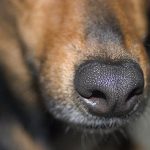Cén Sórt Sróine Atá ag Rúdolf? (Cuid a Trí, 3/3) Posted by róislín on Dec 21, 2011 in Irish Language
(le Róislín)
Cé leis an tsrón seo?
An le fia í?
An le réinfhia í?
An le Rúdolf í?
An le hainmhí eile í, madra mar shampla?
Here’s the last installment of the expanded version of Rudolph questionnaire, first posted in 2009 at https://blogs.transparent.com/irish/ceistiuchan-faoi-rudolf-an-reinfhia/. Today’s blog deals with the original question 12, and now, lo and behold, it takes up blag iomlán.
But first, let’s look at the word “srón” itself:
an tsrón [un trohn, note the “s” has become silent], the nose
sróine [SROHN-yuh], of (a) nose
na sróine, of the nose
sróna, noses
srón, of noses
In the question below, we see the phrase “lena shrón” [LEN-uh hrohn, “s” has become silent] which means “with his nose,” from “le” (with) + “a” (his), plus an “-n-“ to separate the vowels. “Srón” has become lenited because it follows the word for “his.”
12. Maidir lena shrón, cén sórt fia atá i Rudolf? Is fia ______é. (Regarding his nose, what sort of deer is Rúdolf?)
To answer this question, pick the appropriate adjective from the 12 (comhair iad!) below. Of course, some of you may know the answer already, but, what the hey (or should that be féar tirim, i.e. hay, for Rudolph?), there’s some interesting and useful vocabulary as we proceed rhinologically.
a) bánsrónach
b)biorshrónach
c) bolgshrónach
d) caolsrónach
e) clúmhshrónach
f) cruinnsocach
g) deargshrónach
h) iomairshrónach
i) mucshrónach
j)sceadsrónach
k) sciansocach
l) gob-bhuí (gob, beak)
Here’s the vocabulary you’ll need to interpret the adjectives, all of which are compound words using either “-srónach” (-nosed) or “-socach” (-snouted, -nosed), or in the one case, “gob” (beak, promontory).
You might be wondering why the word “srónach” is sometimes, but not always, lenited. It’s because of the so-called d-n-t-l-s rule. If the element preceding “srónach” ends in any of these consonants (d, n, t, l, s), “srónach” isn’t lenited (doesn’t change to “shrónach”). Of these examples, this pertains to a, d, and j. The same principle also applies to “-socach,” which could become “-shocach” in other compounds.
a) bán, white + srónach
b) bior, point + shrónach
c) bolg, stomach + shrónach (although the prefix is “stomach,” this actually refers to a “bottle” shape, as in “míol mór bolgshrónach,” a bottlenosed whale, or “deilf bholgshrónach,” a bottlenose dolphin)
d) caol, narrow, thin + srónach
e) clúmh, down, feathers, fur, hair (on body) + shrónach (refers to “an vombat clúmhshrónach tuaisceartach,” the northern hairy-nosed wombat)
f) cruinn, round + socach
g) dearg, red + shrónach
h) iomair, ridge + shrónach (refers to “an nathair shligreach iomairshrónach,” the ridge-nosed rattlesnake)
i) muc, pig + shrónach
j) scead, spot, blaze + srónach
k) scian, knife + socach
l) gob, beak + b(h)uí (yellow)
The answer, ar ndóigh, is “g”: Is fia deargshrónach é Rúdolf. Rudolph is a red-nosed reindeer.
And, by the way, in case you were wondering, “srón” and its Welsh equivalent, “trwyn,” are pretty much the odd men out in the Indo-European panorama of words for “nose.” Most of the readily recognizable words are related to Latin “nāsus” (naso, Iodáilis; nez, Fraincis; nariz, Spáinnis; næse, Danmhairgis; nosu, SeanBhéarla; nozy, SeanPhrúisis; nās- / nāsā, Sanscrait, etc.). Apparently the Celtic words are related to Old Celtic *srok-nā- and the Sanskrit “srakva-“ (the corner of the mouth).
And how about an tsrón sa phictiúr? An srón fia í? Ní hea! Is srón madra í.
Sin é go dtí an chéad bhlag eile – Róislín
P.S. There is another word for “nose,” in Irish, “gaosán,” but I haven’t dealt with it here since it isn’t used much to describe different types of animal noses, at least not i dtearmeolaíocht zó-eolaíochta, or since we’ve been dealing with Rudolph, a cryptid, perhaps I should say i dtearmeolaíocht criptea-zó-eolaíochta.

Build vocabulary, practice pronunciation, and more with Transparent Language Online. Available anytime, anywhere, on any device.





Leave a comment: